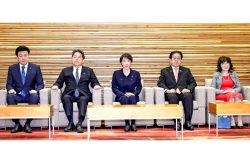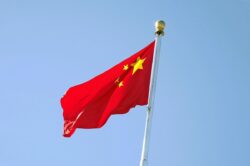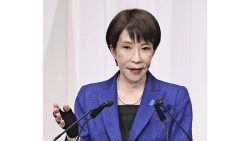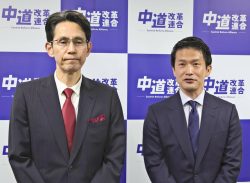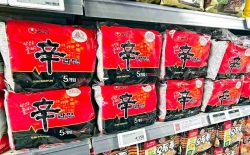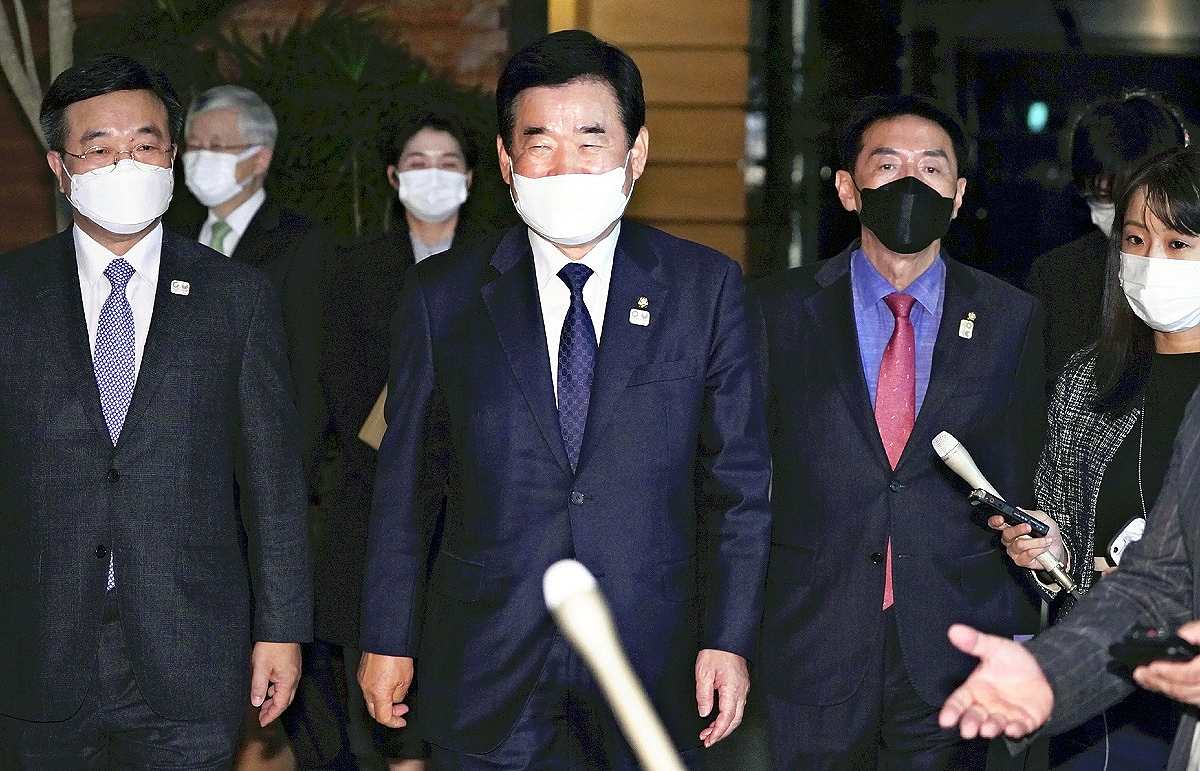
Kim Jin-pyo, center, who chairs the South Korea-Japan Parliamentarians’Union, leaves the Prime Minister’s Office in Tokyo after meeting with Prime Minister Yoshihide Suga on Nov. 13.
12:51 JST, December 2, 2020
SEOUL — A “beautiful settlement,” what could be called an extremely rare case amid constant friction over outstanding bilateral issues between Japan and South Korea under the administration of President Moon Jae-in, has happened.
South Korea has been pushing to include the name East Sea alongside the Sea of Japan in maps for use by international organizations, with Seoul insisting that the current nomenclature has been used widely as a result of Japan’s colonial rule.
However, the 23-year-old issue was resolved at a general meeting of the International Hydrographic Organization (IHO) in November.
New digital nautical charts created by the IHO will use numerical identifiers to designate sea areas instead of names, including for the Sea of Japan. However, the Sea of Japan will continue to be the sole designation for this body of water in the IHO’s current nautical chart, called “Limits of Oceans and Seas.”
It is significant that Japan and South Korea, which had been at loggerheads over the issue, both saw this compromise proposal by the IHO secretary general as an opportunity for a breakthrough.
The proposal’s key point is that it enables the Japanese and South Korean governments to explain the arrangement to their respective citizens in a convincing manner, allowing both to save face.
The Japanese side can say that the Sea of Japan name will remain. The South Korean side can state that the absence of the Sea of Japan name in digital charts, which are likely to become the global map standards in the future, means an obstacle to using the East Sea name has been removed.
This can be interpreted as a win-win result for both sides.
Choi Sang-yong, a professor emeritus at Korea University who is a former ambassador to Japan under the Kim Dae-jung administration, once said, “Diplomacy is the art of timing and wording.”
Indeed, the latest development in this naming issue is a good example of Choi’s eloquent words.
Is it possible to re-create such artful diplomacy for the lawsuits over former wartime requisitioned workers that, similar to the Sea of Japan name issue, South Koreans view as a matter rooted in Japanese colonial rule?
First, regarding the timing, it is worth noting that Moon and people related to South Korea’s ruling party have expressed eagerness for close cooperation between the two countries over the Tokyo Olympics and Paralympics next summer.
Some observers speculate that Seoul has given up trying to resolve the workers’ issue within the year as it now does not see a summit of Japanese, Chinese and South Korean leaders — a meeting Seoul has been aiming to realize this year — as an opportunity to break the impasse.
As for wording, Moon has shown no signs of compromise with his principles of seeking the “implementation” of rulings by the South Korean Supreme Court that ordered Japanese companies to pay compensation to the wartime workers, nor his taking a “victim-centered” approach.
Japan’s position is that South Korea should compensate the former requisitioned workers because the issue of individual claims has already been settled under the 1965 bilateral Agreement on the Settlement of Problems Concerning Property and Claims and on Economic Cooperation.
South Korea insists that some kind of financial payment from the Japanese companies is necessary to resolve the issue.
As long as Moon continues to stick to his principles, even an ambiguous agreement seems out of reach.
If South Korea views next summer’s Tokyo Games as a chance to boost ties between the two countries and a good opportunity to resolve this issue, is it determined to persuade the plaintiffs before then and consider making concessions while finding a way to explain the situation to its people?
If the procrastinations continue, Seoul will not be able to escape accusations of committing a diplomatic blunder, which is far from an art form.
Top Articles in Politics
-

LDP Wins Historic Landslide Victory
-

LDP Wins Landslide Victory, Secures Single-party Majority; Ruling Coalition with JIP Poised to Secure Over 300 seats (UPDATE 1)
-

Japan Tourism Agency Calls for Strengthening Measures Against Overtourism
-

CRA Leadership Election Will Center on Party Rebuilding; Lower House Defeat Leaves Divisions among Former CDPJ, Komeito Members
-

Voters Using AI to Choose Candidates in Japan’s Upcoming General Election; ChatGPT, Other AI Services Found Providing Incorrect Information
JN ACCESS RANKING
-

Japan Institute to Use Domestic Commercial Optical Lattice Clock to Set Japan Standard Time
-

Israeli Ambassador to Japan Speaks about Japan’s Role in the Reconstruction of Gaza
-

Man Infected with Measles May Have Come in Contact with Many People in Tokyo, Went to Store, Restaurant Around When Symptoms Emerged
-

China Eyes Rare Earth Foothold in Malaysia to Maintain Dominance, Counter Japan, U.S.
-

Prudential Life Insurance Plans to Fully Compensate for Damages Caused by Fraudulent Actions Without Waiting for Third-Party Committee Review


